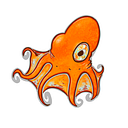Why do parrots smell so good? Science and lifestyle explain the scents.
“If we could bottle that and call it Parfum de Perroquet, we’d make a fortune!”
Doctor and I stood in his Raleigh Durham, NC office, petting a rescue chicken named Butterscotch. I was in town to give a presentation at the local parrot club event. He was working on helping me adopt the chicken to take home to Florida. The realization that chickens do not smell like parrots inspired me. And that parrots smell so good.
“It would cost a fortune to do …” and then the doctor went off on a science facts filled tangent that I rejected on principle alone. We were on an artistic bent of conversation, relishing the thoughts of bottled macaw, or spritzer amazon. The costs were going to be a fortune because first you have to dial in on the scent itself.
What is the essence of, say, Chanel №9? Patchouli, Tonka bean, and vanilla absolute. What is the essence of, say, a cockatiel? Baby powder and linens to my nose. According to a few thousand cockatiel lovers on r/cockatiels on reddit, it’s books, waffles and syrup, powder, cucumbers, biscuits, and toast. And that is where making parrot perfume will get tricky. Every parrot smells different to every person.
There is science to support the idea that parrots, particularly the dander producing parrots, have a scent. There is also science to support that a good smelling parrot isn’t science at all but a healthy parrot being mindful to care and preen its feathers religiously. I reject that last idea on principle and empirical evidence gathered over a decade of working with companion parrots. I am forced to rebuttal. “Ugh-uh! Yes, they do too smell good!”
Our seven parrots have their personal and distinct heavenly scents. Eu de toilette. Not to be confused with eu de parfum. Parrot scents are a hint, light, a promise in the air. You’ll need to stick your nose into their floofs (not a science word) to get a heady high. Ask anyone that lives the parrot lifestyle. We are all parrot sniffers. Our flock smells like sunshine, handmade soap, popcorn, and linens. The r/parrots group added fruit, hay, and muffins.
Parrots smell good for a few good reasons.
· Their uropygial gland, or preen gland, is located at the base of their back just before their tail feathers. This gland produces a waxy substance they pick up by rubbing their face over the wick (pulvinus) feathers, then spreading the fatty acids and alcohols mix over and through their feathers while preening. As a result, they may have a powdery or slightly waxy feel and a pleasant smell. Some people describe the scent of cockatiels as smelling like powder.
· Diet. What a parrot eats affects their skin, feathers, and overall health. Which affects the health and contents of their preening gland and pulvinus.
· Health. A healthy parrot preens with extreme prejudice. Care and concern could go on for a few hours. Feather care leads to skin care, which leads to a healthy preen gland and pulvinus, able to supply its fatty acids and alcohols with ease and success.
· Hormones. Hormones affect how much a parrot eats, and what your bird will eat while feeling the surge of hormones. This affects their feathers and health, which affects their drive to preen and care for themselves. Some parrots exhibit a strong odor during the mating season or high hormone seasons. Every parrot is different.
· Environment plays a large part in the conversation of parrot smells both good and bad. A companion parrot kept in a closed home with cooking odors, smokers, or vaping may smell. Air quality has a direct effect on a parrot’s health. Which affects their preening gland health. Which affects how their skin, feathers, and floofs smell.
· Genetics. Some parrot species may have a naturally pleasant scent because of genetic factors.
Taken in a holistic view, a parrot’s scent can be subjective and may vary depending on individual perception as well. Other external factors can also influence the scent of a parrot as handling and exposure to other animals or scents. And every parrot lives a different lifestyle. Which is why you’ll read, hear, or attest that your bird smells like caramel corn while your friend’s same species of parrot smells like laundry detergent. Our parrot’s scents are a summation of our parrot’s lifestyle.
The exciting news for all my fellow parrot sniffers in the world of companion parrots, there is a real parrot eu de parfum available. Cockatiel. Which proves that the idea doctor and I hatched while petting a chicken was genius. I knew it all along.
Until my sample Cockatiel eu de parfum arrives, I’ll continue to enjoy Butters’ sunshine macaw smell, our cockatiels’ baby powder smell, and Felix’s angsty smell. Being an African gray parrot, Felix is eu de curmudgeon. A cross between beef jerky and clams.
